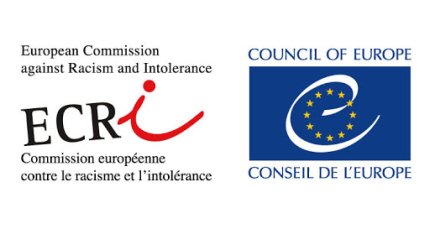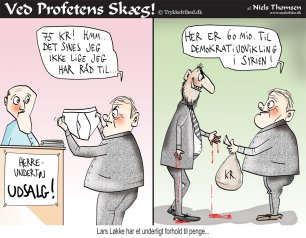What is the ECRI
The European Commission against Racism and Intolerance (ECRI) is a supervisory body of the Council of Europe. The ECRI monitors European countries' respect for human rights, in particular "the fight against racism, discrimination (on the grounds of" race ", ethnic / national origin, color, nationality, religion, language, sexual orientation and gender identity), xenophobia, anti-Semitism and intolerance".
Each of the 47 member states of the Council of Europe has appointed a representative to the ECRI on the basis of its "independence, impartiality, moral habit, and expertise in dealing with issues such as racism, discrimination, xenophobia, anti-Semitism and intolerance".
The Commission visits 8-10 European countries every year and returns to each country every 5 years. In 2019, the ECRI began its 6th round since the organization began its monitoring in 1994. This time, the ECRI focuses on three themes: real equality and access to rights, hate speech and hate-motivated violence, and integration and inclusion.
Among the most recently evaluated countries are Germany, Switzerland and Austria.
Monitoring of Germany
On 17 March 2020, the ECRI published its 6th country report for Germany.
The ECRI initially welcomes the German 'welcome culture' in 2015, when an extraordinary number of asylum seekers arrived in the country. "The Chancellor and several ministers went public and distanced themselves from hate speech, and called on social media to enforce their guidelines on removing hateful content." But: "Despite the progress made, several things give cause for concern." Thus, the ECRI have concluded that xenophobia has increased in recent years, and that hate speech has become more common. The 'welcome culture' had, admittedly, mobilized hundreds of thousands, but: "Other sections of the population were concerned about the wave of migrants. Hostile and xenophobic attitudes became more widespread and public debate worsened." The progress of the Alternative für Deutschland (AfD), the case of the sexual assaults on New Year's Eve in Cologne, the terrorist attack on a Christmas market in Berlin on 19 December, 2016, and awareness of other crimes committed by immigrants, is said to have "further intensified fear, xenophobia and racism".
To address this, the ECRI say that "action is needed in several areas to prevent and combat hate speech. This includes raising awareness, preventing and responding to opinions, supporting victims, self-regulation, the use of legislative power and, as a last resort, criminal investigation and punishment. "
"The ECRI also regrets that there is no mechanism in place that would ensure that social media systematically passes on relevant criminal content to the police for the purpose of prosecution. The general preventive effect of prosecution and sentencing in hate speech cases can therefore not be fully unfolded. (...) The ECRI recommends that the German authorities standardize access to, and rules, for reporting hate speech on social media, ensuring that evidence of hate speech on the Internet is preserved and passed on to law enforcement, and develop methods by which police and prosecutors may close new channels for spreading hate speech online. "
The ECRI does not speak in vain; Germany has already implemented several of the ECRI's recommendations.
Germany has complied with the ECRI's recommendation from its 5th report to legislate an obligation to "suspend public support for organizations, including political parties that promote racism". In their 6th report, the ECRI recommends examining whether the measure can be applied against Alternative für Deutchland.
The ECRI notes with satisfaction that in March 2017, the German Press Council extended Article 12 of their Press Code - particularly prompted by the debate following the atrocities on New Year's Eve 2015 in Cologne. According to paragraph 12.1 ", any connection of a suspect to an ethnic, religious or other minority group should not normally be mentioned unless there is a well-founded public interest in knowing this. The ECRI recalls that such information should only be disclosed by the police if it is strictly necessary and serves a legitimate purpose ".
The ECRI also praises Germany for the country's censorship law NetzDG, which was implemented in 2017. According to the law, social media platforms such as Facebook, Twitter and YouTube must censor their users on behalf of the German state. Social media companies have been instructed to delete or block any "online crime" such as defamation, slander, derogatory speech or incitement within 24 hours (7 days in complicated cases) after receiving a user complaint - whether the content is truthful or not.
In recent years, Germany has had an annual "Action Day against Hateful Postings". In 2019, there were two actions. At first, there were coordinated police raids in 13 states against suspects who were supposed to have written hateful postings online. In 38 cases, homes were searched, and suspects questioned, federal criminal police announced. In the second operation, there were police raids in 9 states, and in 21 cases, there were searches of apartments and interrogations. The number of registered hate crimes on the Internet has fallen, but the federal police still strongly urge citizens to become informants.
Monitoring of Switzerland
The ECRI published its first report on Switzerland in 1998. The ECRI admitted that overt expressions of racist prejudice and xenophobia were "very rare". The Swiss media should nevertheless promote certain narratives: "it seems necessary to make the Swiss media aware of their responsibilities in relation to the problems of racism and intolerance. In addition, the mass media should be encouraged to take initiatives to combat racism and intolerance (e.g. by showing some positive cases of fruitful coexistence between different groups). " "It would be highly desirable to have codes of conduct in the various media professions whereby the media practices self-regulation."
The second report came in 2000. The ECRI still acknowledged that "open expressions of racism are quite rare in Switzerland". The ECRI was nevertheless "concerned that a climate of intolerance and xenophobia towards foreigners, and those different from the native Swiss population, apparently persists."
In the 4th Report of 2009, the ECRI again criticizes the media: "a widespread and recurring problem in the Swiss media is the practice in criminal cases of mentioning the country of origin of the suspect or convicted person, even if this information is irrelevant. For the sake of transparency, the police provide the media with "objective" information about suspects, including their age and nationality, which the media then pass on without always questioning its relevance. However, that approach may be difficult to justify in some cases. "
In 2014, the concept of "hate speech" found its way into the ECRI's 5th report: "Blacks, Yenis and Roma are experiencing a significant deterioration in their situation and in the political climate. Refugees, frontier workers and LGBT people are also exposed to hate speech." And further: "the ECRI believes that the authorities, especially the prosecution, should introduce zero tolerance towards all racist statements from politicians (...) The more freedom politicians have to make racist remarks with impunity, the fewer scruples citizens themselves will have to make racist comments ".
The ECRI again criticized the media and called on the Swiss authorities, in close cooperation with representatives of the media, to draw up an action plan to address the established routines that could stigmatize media coverage on vulnerable groups, especially Roma and people of color.
The ECRI was also dissatisfied with the authorities' inadequate follow-up on complaints about racist comments on the Internet. The ECRI recommended that "the Swiss authorities give one or more police units (...) responsibility for actively combating hate speech online".
However, the ECRI praised Switzerland for following their previous recommendations: "The ECRI notes with satisfaction that several online newspapers have introduced self-regulatory measures, such as a more systematic moderation of comments, the abolition of anonymous profiles, and the automatic closure of accounts for racist individuals’ utterances ".
In the 6th report from 2019, the ECRI criticizes the media for having too many features on the construction of minarets and radicalization, as it is an "intolerant discourse against Muslims". "The ECRI believes that states should create a greater understanding of the dangers, and the unacceptance, of hate speech. Countries should combat misinformation, negative prejudice and stigma; develop education programs for children and young people, government officials and the public; support NGOs and equality bodies that work to combat hate speech, and encourage celebrities to respond quickly to hate speech ".
The ECRI recommends codes of conduct for politicians and the media to combat hate speech.
The Swiss authorities "are working with relevant ISPs to improve the identification of authors of hate speech, and to remove such content as soon as possible".
Monitoring of Austria
With the large immigration to Western Europe in 2015, insecurity increased after the sexual assaults on New Year's Eve 2015 in Cologne and other cities, including Vienna and Salzburg in Austria. Just as in Cologne, a very large proportion of the suspects here were foreigners.
The increased Islamization of Austria has created a counterculture that springs from mosques, among other things. This was demonstrated by the Austrian Integration Fund, ÔIF, in a report published in 2017: "The Mosque's Role in the Integration Process". Out of 16 mosques surveyed, half preached "a two-part worldview whose focal point is a division of the world into Muslims on the one hand and everyone else on the other." Six of the mosques practiced a 'significant degradation of Western society'. "
The Austrian Federal Office for Constitutional Protection and Counter-Terrorism, BVT, warned in its 2018 annual report that the country's biggest threat remains Islamist extremism and terrorism. The "so-called 'returnees' pose a significant threat to internal security", and it is a security challenge that Islamic State jihadists may be smuggled into Austria and the rest of Europe with migrant flows.
The ECRI does not recognize these real challenges in their monitoring of Austria. They criticize in their 6th country report on Austria that "public discourse in recent years has become more xenophobic, and political speeches have had divisive and irreconcilable overtones - especially directed at Muslims and refugees. With the arrival of a large number of asylum seekers during the European migrant crisis in 2015, they also saw an escalation of anti-migrant and anti-Muslim sentiments, in which newcomers were described as a threat to security, national identity and culture ".
The ECRI also writes: "Some politicians and the media continue to portray Muslims in a negative light. Allegations of a perceived lack of integration of Muslims in Austria, and that their alleged opposition to 'fundamental Austrian values' should lead to violent extremism, are common in public discourse, contributing to a climate of distrust and fear of Muslims. "
To remedy this, the ECRI recommends that several measures be taken "in order to combat hate speech by developing a counter-narrative".
"For example, the Council of Europe 'No Hate Speech' campaign established a national committee in 2016. They launched the #makelovegreatagain campaign in 2017, and are still running various information campaigns involving several actors, including government agencies and NGOs. Since July 2018, Neustart, which is the Austrian criminal system, has, in collaboration with the Public Prosecutor's Office, launched the program 'Dialogue Statt Hass' (Dialogue instead of Hate), which intends to develop a constructive response to hate speech by giving the perpetrator a sense of wrongdoing, and get the person to reflect on this in order to subsequently change behavior ".
The ECRI praises Austria for setting up the #GegenHassimNetz (Online Anti-Hate) Counseling Center for victims and witnesses of online hate in 2017. "The IT Security Portal, which is an inter-ministerial initiative, also provides an overview of effective preventive measures, reporting mechanisms, as well as advice centers on hate speech."
In 2018, Austria entered into an agreement with Facebook, in which Facebook must identify and remove hateful content within 24 hours. The Federal Office for Constitutional Protection and Counter-Terrorism has on its website provided the possibility for Internet users to report racist content.



